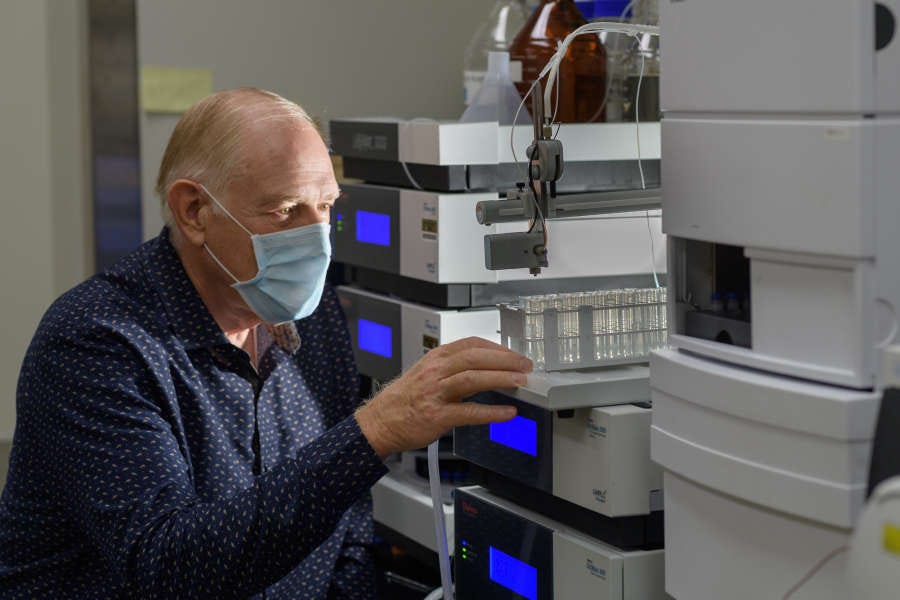$53M Boosts Philip Low’s Cancer-Fighting Umoja
 Purdue researcher Dr. Philip Low in his lab. (Courtesy: John Underwood
Purdue researcher Dr. Philip Low in his lab. (Courtesy: John Underwood
Subscriber Benefit
As a subscriber you can listen to articles at work, in the car, or while you work out. Subscribe NowPurdue University’s Dr. Philip Low, already a legend in Indiana’s life sciences sector after founding and selling Endocyte for $2 billion, is well on the path toward his next potential “game-changer.” The serial entrepreneur’s most recent project, Umoja Biopharma, recently secured $53 million in Series A financing—one of the largest initial rounds of funding ever for a Purdue-affiliated company. Led by entrepreneurs that have sold startups for billions, Umoja seems destined to be Indiana’s next life sciences success story by refining the cancer-fighting power of immunotherapy.
Immunotherapy, using the body’s own immune system to fight cancer, is described as revolutionary, uncovering cures for a variety of cancers. The method centers on killer T-cells, the body’s natural immune system cells that fight infections. The T-cells are isolated from the person’s blood, reprogrammed and multiplied outside the body, then reinjected as “CAR” T-cells to attack cancer cells. But immunotherapy is so powerful, it can easily spin out of control.
“Earlier versions of the CAR T-cell technology have no control over the rate of killing, so not an insignificant number of patients have actually died from an over-active immune attack on the cancer cells, leading to what’s called a cytokine storm…where the immune system becomes so over-activated that the release of immune-activating components can actually kill the patient,” says Low, Purdue Presidential Scholar for Drug Discovery and the Ralph C. Corley Distinguished Professor of chemistry.
Low says Umoja’s technology addresses this grand challenge of immunotherapy with its “exquisitely controlled” CAR T-cells. Rather than reprogramming the T-cell, Umoja has created a “bridging molecule” that is easily synthesized, or reproduced. One end of the bridging molecule binds specifically to the killer T-cell, and the other end recognizes and immediately bridges to the cancer cell; formation of this link activates the immune cell to kill the cancer cell.
“The advantage of our approach is we can turn on, turn off or accelerate this reaction as we wish. We just simply add this tiny bridging molecule; the more we add, the more we trigger immune cells to engage and kill cancer cells. The less we add, the less it happens,” says Low. “This ability to sensitively control the killing reaction is very critical…it gives us flexibility to control what is a very powerful, but otherwise uncontrollable cytotoxic mechanism—a killing mechanism.”
Low says, unlike earlier CAR T-cell technologies, Umoja’s method also allows scientists to “give the immune cells a rest.” This is another critical advantage, because current CAR T-cell treatments sometimes fail for the patient when the little warriors are overwhelmed by the amount of cancer cells to kill and become exhausted. As a result, says Low, they “just quit functioning and sit there in the tumor, but don’t kill anything.” Umoja says it can withhold the bridging molecule, giving the T-cells a chance to rejuvenate and then re-launch their attack—more potent the second time around.
Low says another weakness of current CAR T-cell treatment is, even if the cells successfully kill the cancer, they can’t be turned off, and often begin attacking healthy tissue. However, Umoja can “call off the dogs, so to speak, when we have eradicated the tumor” by no longer adding the bridging molecule.
These critical breakthroughs were developed at Purdue, but Low says the startup’s executive team enhances the startup’s manufacturing expertise. Umoja’s co-founders include Dr. Andy Scharenberg and Dr. Michael Jensen, who founded Juno Therapeutics, Inc. and sold it to Celgene for $11.7 billion.
“As soon as Mike sold it, he called me up and said, ‘Phil, I like your technology very much; let’s start a company based on your technology’ and also some technology Mike was bringing in that is synergistic with what [Umoja] had developed,” says Low. “Then, Andy brought in some creative technology that will be very important in the manufacturing of these CAR T-cells.”
Low says Umoja is working to clear another major immunotherapy hurdle by producing its T-cells for a fraction of the current cost; pharmaceutical companies have told him treating a single patient with current CAR T-cell technologies—removing, reprogramming and reinjecting the cells—can cost $1 million. But Umoja aims to manufacture the CAR T-cells without removing them from the patient.
“The particles involved in genetically engineering the T-cells are put right into the patient, where they home in on the T-cells and change the genes inside, without ever requiring removal of the T-cells from the patient,” says Low. “We anticipate this could be a game-changer for this genetically-engineered immune cell technology.”
Low says the sensitive control of Umoja’s CAR T-cells is close to being tested in humans, and the manufacturing process is not far behind. The recent dose of confidence from investors—to the tune of $53 million—advances Low and his team one step closer to the goal line.
“I’ve been successful with prior companies, so money’s not a motivation. My major motivation now is to develop therapies that will save lives and reduce pain and morbidity,” says Low. “I’ve had enough friends and relatives come down with cancer when they were still very productive and needed by their families, communities and careers—and then suddenly be removed by a serious disease. I am very grateful for the opportunity to address a lot of these serious problems and hopefully leave a footprint on the planet.”
Low believes Umoja attracted record-breaking funding because it meets the two critical requirements of excellent technology and great leadership.
Low has launched several startups, and says Umoja will benefit from lessons learned, especially from Endocyte.
